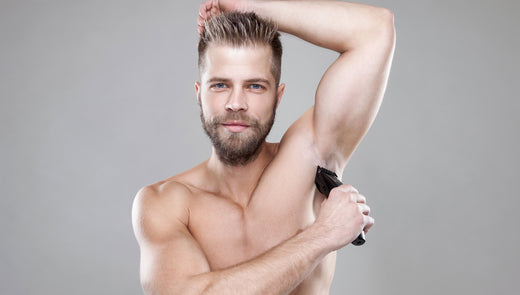Your Cart is Empty

One minute you’re casually chatting with friends, sipping margaritas and dipping tortilla chips in a nice, spicy salsa. The next minute your forehead and armpits are dripping like someone turned on a faucet. Whether you suffer from hyperhidrosis or only perspire when you eat, learning about the foods that make you sweat can help prevent future embarrassment.
Why does food make us sweat? The most common reason is that certain foods have a thermogenic effect in your body. This simply means when the food breaks down, a portion of it is released as heat into your body during digestion. When your body works harder or takes longer to digest certain foods, the thermogenic effect increases. And as your temperature rises, your body automatically tries to cool it down by sweating.
If you're wondering which foods make you sweat, this article is for you. Below we highlight seven foods that make you sweat and the reasons why.
This post was originally published in December 2019, and was updated in May 2021.
When you eat foods that contain a lot of sodium, your body is forced to get rid of the excess as urine and sweat. If you already sweat excessively, eating salty foods may only compound the problem. That's why salty foods top our list of foods that cause sweating.
To steer clear of a sweaty situation, avoid foods like cured meats, salad dressings, bacon, instant soup, potato chips, roasted nuts, and most canned foods including canned vegetables.
Next up on our list of sweat-inducing foods are ones you probably could cut down on even if you don't suffer from excessive sweating... Processed foods typically lack the fiber and enzymes necessary for your food to digest properly. When foods are also high in fat, your body goes into overdrive to process them, making digestion even more difficult. Any time your body struggles to digest after meal, perspiration increases.
To avoid an uncomfortable and sweaty aftermath, refrain from eating fatty or processed foods like deep-fried foods, fast food, crackers, margarine, bread, savory snacks, frozen or microwavable meals.
Drinking coffee in the morning is a great way to jolt you awake. But what else does it do? When that shot of caffeine sets your central nervous system into motion, your heart rate increases and your blood pressure goes up. After this happens, your body begins to simulate the flight or fight response, awakening your sweat glands. The heat from the coffee also raises your internal body temperature, making the sweat pores open even further.
In short, while coffee is a great way to wake up, it's a terrible addition to your diet if you're trying to manage your sweating. To avoid this effect, limit your consumption of coffee, black and green teas, and energy drinks.

Who doesn’t enjoy a glass of wine or cold craft beer among friends? Unfortunately, when one glass turns into two or three or more, your body begins to overheat. When your body starts to overheat, your heart rate increases and your internal body temperature rises. The natural reaction to cool things down and restore balance is to start sweating. Once the process starts, it continues until your body’s internal thermometer is normal. If you continue to drink, so does your body’s natural process of self-correction.
The more you drink, the more you sweat... seems like a reason to call it an early night more often!
Spicy curry, hot wings, or wasabi are a few of the spicy foods that can cause excessive sweating. These foods, among other spicy dishes, typically contain Capsaicin. This active compound creates a burning sensation when it comes into contact with tissue. (It's the sensation spicy-food lovers enjoy in a fiery dish.)
However, when you eat spicy foods, the Capsaicin tricks the nerves that make your body feel warmer. This triggers your sweat glands to start the cooling process. Thus, spicy dishes are among the top foods that make you sweat.
Comfort foods like pasta, bread, potatoes and ice cream may be Grandma’s way of showing love, but they do more trouble than good when it comes to sweat. Foods that are high in carbohydrates and sugar are known to produce a significant thermic effect when eaten because they are more difficult to breakdown.
Additionally, foods high in sugar can cause insulin spikes which can result in heavy sweating.
High-sugar/carb foods are a double-whammy in the "sweat-inducing" category, so consider cutting them down to try and manage excessive sweating.
Believe it or not, the term “meat sweats” has some credibility. While foods high in protein have health benefits, they are also thermogenic foods. This means they give up part of the energy they contain as heat. For example, to digest four bites of a delicious filet mignon steak, your body must release the equivalent of one bite as heat.
Additionally, when you eat a lot of protein, your body breaks it down and forms urea as a byproduct. As urea in your body becomes excessive, your body has to dispose of it and that happens through excessive sweating. Another double-whammy sweat-inducing food you might want to balance in your diet.
Save this photo to remember the list of foods that make you sweat:

Another common reason for sweating during or after a meal is that some excess compounds need to be flushed out of your system. When these compounds are flushed out of your body as sweat, the composition of your sweat changes. This results in a noticeably fragrant substance.
This is particularly noticeable with foods containing onion and/or garlic. Your body can easily turn into a diffuser of body odor after you eat a dish containing a large amount of garlic and onions. This is a result of allium, a chemical found in onions and garlic, which your body converts to a sulfur compound.
If you want to control the way your body sweats and smells, take a good look at what you put into it. Start small by making simple dietary changes to help minimize sweat and odor. Check out our list of 13 foods that help reduce sweating to help you with your dietary choices. If the sweating persists, start a food journal to try to identify the specific foods that make you sweat excessively.
In addition to making dietary changes to stop sweating, wear an Ejis sweat proof undershirt or a pair of Ejis sweat proof boxer briefs (buy in our shop or on Amazon) to regain your confidence and protect your clothing from sweat marks.


